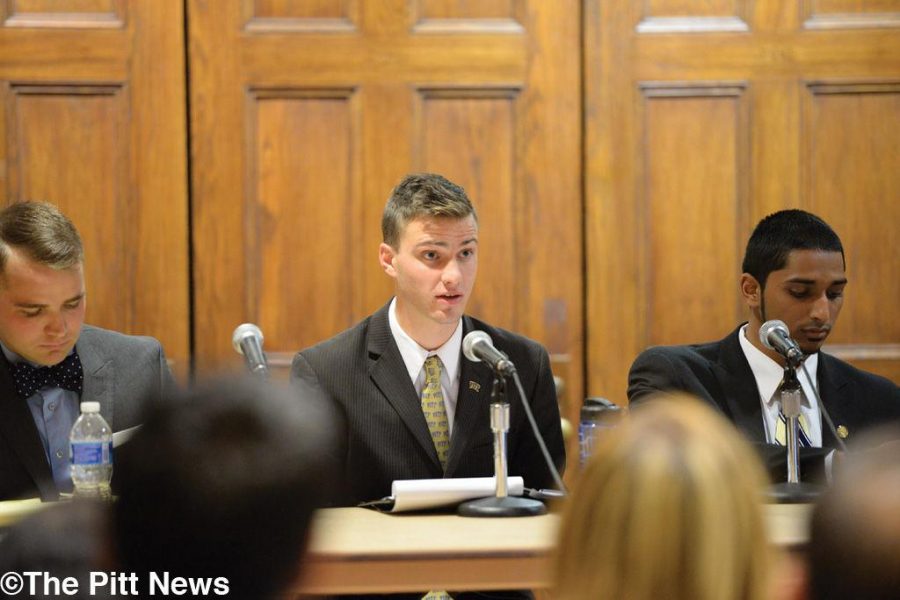SGB candidates debate responsibilities
November 5, 2014
The presidential candidates told stories about throwing sea stars and building bridges during last night’s presidential debate.
Andrew Stefanick, Graeme Meyer and Wasi Mohamed discussed their plans for the future of Student Government Board in a roughly one-hour debate on Tuesday in Nordy’s Place.
Meyer, a junior majoring in engineering and economic statistics, is running independently, though he is affiliated with the 87’s slate comprised of Allocations Committee Chair Nasreen Harun, current Board member Meghan Murphy and Everett Green, a sophomore majoring in finance.
Mohamed, a senior majoring in history, philosophy of science and neuroscience, is running with the Bridges slate with Matt Sykes, a junior majoring in industrial engineering and Natalie Dall, a sophomore majoring in molecular biology.
Stefanick, a senior accounting and economics major, is running with the Pitt United slate with Jessica Snyder, a junior majoring in resources management and accounting, and Jack Heidecker, a sophomore majoring in German and political science.
Allocations
Stefanick said he doesn’t want to expand the allocations process.
“Keep it centralized, and keep it simple,” Stefanick said.
Mohamed said he thinks the current Allocations process is “too centralized,” so more on-campus organizations, such as Pitt Serves, should contribute to the allocations process.
“One Board can’t be expected to know about every group on campus,” Mohamed said.
Meyer said he “respectfully disagreed” with Mohamed’s plans to decentralize the allocations process.
Meyer said “decentralizing [the Allocations process] and making it a larger process would just add to that confusion.”
Meyer proposed that SGB members should instead reach out to students with more specific guidelines for the allocations process, so student groups “know what to expect” when requesting funds.
Structure
Stefanick said he thinks part of the problem with the structure of Student Government is the lack of diversity in the Board members.
“We cannot pull from the same handful of students that we have in the past,” Stefanick said. “It feels as if there is a dynasty on Student Government.”
Stefanick said he first wants to create a student assembly or student senate if he is President, adding that his “sense of realism” would help future candidates understand their roles before they run for Board.
“I think people resigning get frustrated,” Stefanick said. “They have great ideas, but when they put them to practice, they realize there’s much more work to it.”
Stefanick said the Board needs to focus on relationship building at the beginning of the term.
“Once we get together, we need to be a team, and that needs to be harped on since day one,” Stefanick said.
Mohamed said he intends to do this by “involving student groups who already exist, using the passions they already have.” For instance, Mohamed said he has already reached out to the Campus Women’s Organization to talk about ways to combat sexual assault on campus.
“You don’t make Student Government bigger by making the committees bigger and adding more students to the committee and making a campus senate,” Mohamed said.
Mohamed said future Board members need to “allow failures to happen,” and not be discouraged when they can’t complete all their initiatives. He said he believes this may have been why there were so many resignations during the last term.
“I don’t really justify quitting for any reason,” Mohamed said. “It’s pretty common that projects don’t get done. Just because you hit a roadblock, you don’t stop.”
Mohamed said he wants the Board to work with student groups on more initiatives to “empower” more student leaders outside of SGB and take on some of the workload of Board members.
Meyer said his term on Board has given him insight on what does and doesn’t work about the structure of Student Government.
When it comes to keeping Board members around for their entire terms, Meyer said he wants to take a “preventative approach.”
Meyer said he wants to establish “realistic expectations” for the Board candidates and “break things down into smaller steps,” so Board member’s projects are more manageable.
Meyer used a story about sea stars to explain his idea. In the story, a girl is trying to save sea stars that washed up on shore. An old man tells her it’s pointless because there are too many stars.
The girl in the story, Meyer said, replied, “But I made a difference to that one.”
Meyer compared the story to his plans to future Board members.
“Although you come in with lofty ideas, you need to take it slow,” Meyer said. “Take those small victories day by day.”
Why they think they’re the best candidate
Andrew Stefanick said he would bring enthusiasm to the Board, adding that if elected, he would make sure the Board members leave the eighth floor during office hours to communicate with students.
“It needs to be something intrusive,” Stefanick said. “Because people don’t want to reach out to [Student Government].”
Meyer said his experience as a Board member allowed him to form relationships with administrators, city officials and the student body.
“I don’t have to spend the first few weeks of months [of my term] building those relationships,” Meyer said.
Mohamed introduced himself with a recap of the poem, “The Bridge Builder,” by Allen Dromgoole.
In the poem, an old man comes to a chasm and successfully crosses it. But instead of continuing on his way, he builds a bridge so younger people can cross chasm without difficulty.
“I made relationships without SGB,” Mohamed said. “So why did I need it?”
Mohamed said he decided to run for Student Government President to help the student body and “build bridges” to access SGB.








